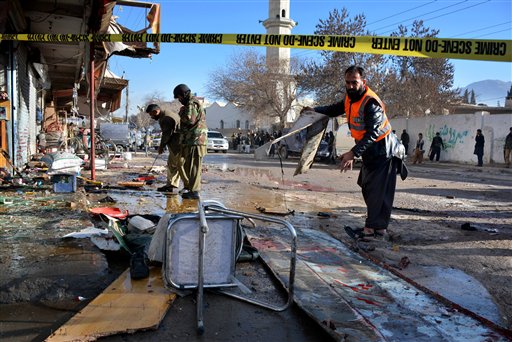Suicide attack on Pakistan polio center kills 15

Pakistani security officials examine at the site of suicide bombing in Quetta, Pakistan, Wednesday, Jan. 13, 2016. The suicide attack on a polio vaccination center in southwestern Pakistan killed more than a dozen people and wounded many, officials said. (AP Photo/Arshad Butt)
QUETTA, Pakistan — A suicide attack on a polio vaccination center in southwestern Pakistan on Wednesday killed 15 people, mainly police who had gathered to escort health workers, who have been repeatedly targeted in recent years by Islamic militants, officials said.
The bombing of the polio center on the outskirts of Quetta killed 13 police, a soldier and a civilian, said Shahzada Farhat, a police spokesman in the city. Another 23 people were wounded.
The suicide bomber detonated his explosives among the police officers, said provincial home minister Sarfraz Bugti. “We’re in a war zone,” he added.
The bombing happened outside the polio center shortly before vaccination teams were due to be dispatched to local neighborhoods as part of a three-day immunization campaign, said Syed Imtiaz Shah, the local police chief.
Hours after the attack, Ahmad Marwat, who described himself as a spokesman for Jundullah, or Army of God, a little-known militant group, claimed responsibility without explaining why the center was targeted. He warned of more attacks on polio teams in the future.
Article continues after this advertisementPolio workers in Pakistan, and their police escorts, have been targeted in recent years by Islamic militants who accuse them of working as spies for the United States.
Article continues after this advertisementThe attacks intensified after a Pakistani doctor was arrested on charges of running a fake hepatitis vaccination campaign in the city of Abbottabad as a cover for a CIA-backed effort to obtain DNA samples from Osama bin Laden ahead of the 2011 U.S. raid that killed him.
Pakistan is one of three countries in the world where polio is endemic, and the attacks have hindered vaccination campaigns. Some Pakistanis are also suspicious about the vaccinations, fearing it will sterilize their children.
Shah, the police chief, said the security forces were the primary target of Wednesday’s attack. He spoke to reporters from the scene, which was strewn with blood and debris, as rescuers took the wounded to hospitals.
Quetta is the capital of southwestern Baluchistan province, where a low-level insurgency has long been waged by Baloch separatist groups demanding a greater share of the region’s natural resources or outright independence.
Al-Qaida, the Taliban and other Sunni militant groups are also active in the region. Tens of thousands have been killed in Pakistan over the past decade in attacks mainly targeting security forces and the country’s Shiite minority. TVJ